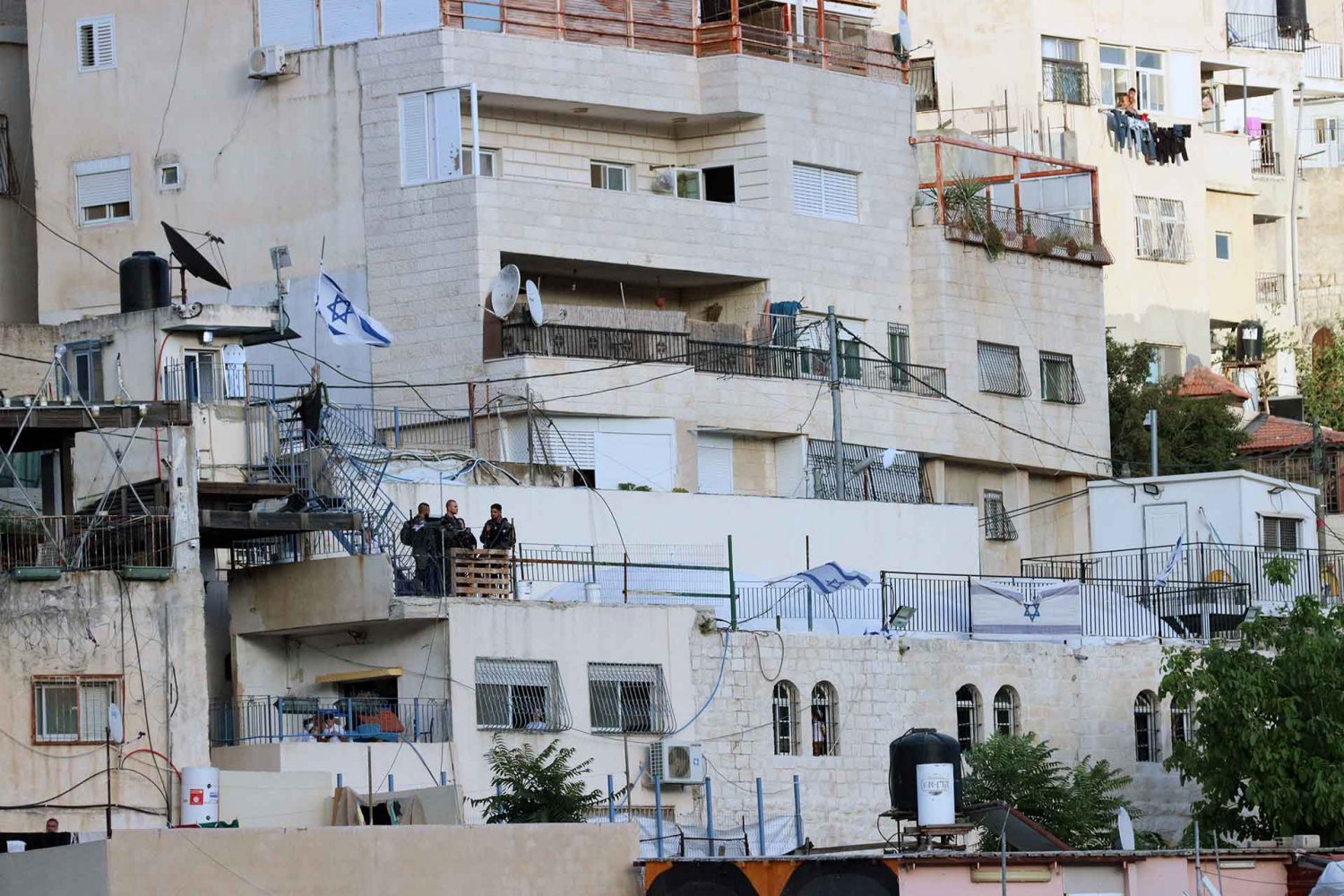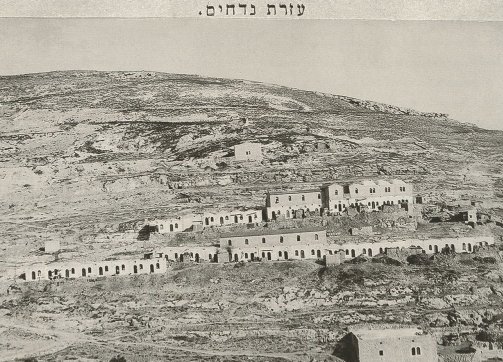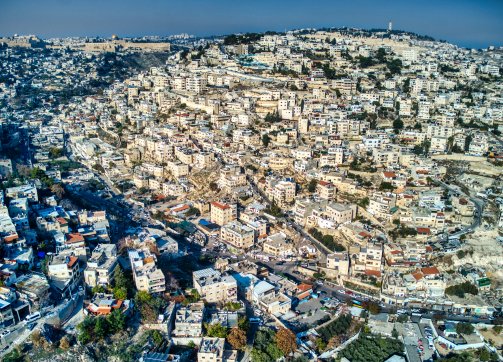Buildings as Barriers

Credit:
Active Stills/ Heather Sharona Weiss
One Lot at a Time, Israeli Settlers Expand Their Presence in Palestinian Silwan
Snapshot
The crisis in Gaza is providing cover for Israeli settlers to slowly expand their hold on Jerusalem. In Silwan, they confiscated a small parking lot, turning it into an onerous barrier and police outpost with amplified effect on Palestinian residents’ lives.
In February, Israeli settlers razed a parking lot in the Batn al-Hawa section of the Palestinian neighborhood of Silwan in East Jerusalem. The construction shaved nearly ten feet off the street; now two cars can’t pass each other along the narrow route. A guard booth was erected next to the plot, with police patrolling the site 24 hours a day.
“Almost 20 families here are not allowed to use this area,” resident Zuheir Rajabi told Jerusalem Story. He lives just a few homes away from the former parking lot.1 “By settlers taking this land, they cut the neighborhood into two.”
Rajabi explained that children, who previously used the walkway next to the parking lot to go to school, are now blocked from this route. Instead, they are forced to go around the neighborhood to reach their classes. The result is a microcosm of how settlements impede Palestinian daily life throughout the West Bank (see The Three Israeli Settlement Rings in and around Jerusalem: Supplanting Palestinian Jerusalem).
“The hardest thing is that there are some disabled people, including one lady who has severe obesity and needs special assistance to get out, and now she can’t anymore,” Rajabi said. She used to park her car right where the Israeli security guard now stands. “If she needs to go to the hospital or something, it won’t be easy to take her.”
One Plot of Land
In 2002, Batn al-Hawa residents bought the plot from a Palestinian landowner to turn it into a parking lot. Using Israel’s 1970 Legal and Administrative Matters Law,2 which allows Jews—but not Palestinians—to claim ownership of land lost after the 1948 partition of Palestine, the Jewish settler organization Ateret Cohanim gained control of the property in 2004. Yet the settlers only began construction on the property this year.
“They took advantage of this sensitive time,” Rajabi said, referring to the ongoing Israeli war on Gaza.
About 650 Palestinians in Batn al-Hawa, including Rajabi’s family, face eviction due to Ateret Cohanim lawsuits against them, again using the aforementioned law to claim ownership and expel them from their homes. Rajabi said Ateret Cohanim has taken over six buildings since 2004, pushing Palestinians out of the neighborhood.
Legal Measures
Rajabi doesn’t know what Ateret Cohanim is building atop the parking lot ruins. A press release from the group states they are planning to build a parking lot primarily for the neighborhood’s Jewish settlers, specifically members of the Benvenisti Trust, which Ateret Cohanim controls.3 The parking lot is currently reserved for workers turning the Palestinian home next door, seized by Ateret Cohanim in 2015, into a synagogue, and for police vehicles. The statement notes that if spots are available, then Palestinian and other Jewish residents can use it. It reads:
Stage one of “hugging” the property is to fence off the area and then eventually to turn the property into a formal and safe car park, which will service the Trust members, workers of the adjacent Synagogue restoration project, Police vehicles and if spaces remain, also for both Jews and Arabs of the neighborhood.4
Ateret Cohanim’s director Daniel Luria denied that his organization manages the trust. He said that the property belongs to the trust and not Ateret Cohanim.5 “[T]here was never truly any official car park on the property. And no parking lot was demolished whatsoever. Arabs had simply parked their cars without permission on part of an empty block of land,” Luria told Jerusalem Story in an email. “The property is NOW SIMPLY BACK with the sanctified trust (not Ateret Cohanim). And my understanding is that part of the property will be properly turned into a formal yet temporary car parking lot.”6
Jerusalem Story also reached out unsuccessfully to the trust’s representative, attorney Avi Sheferman.
According to Rajabi, Ateret Cohanim sought to change the property from public to private in February, after beginning construction work on the plot. In response, Rajabi filed a lawsuit against the settler group and the municipality for permitting the property to be changed from public land to private. Rajabi had to pay NIS 10,000 (about $2,700) when submitting the lawsuit.
In another case, Rajabi said residents had to provide NIS 200,000 (about $54,360) in order to freeze an eviction order for one family. The court has given Rajabi until May 9, 2024, to submit evidence that elderly and disabled individuals live near the lot.
“There are endless examples of this exact case, in which the court will just let the case die out and keep asking the people to put more money in as deposit until [the petitioners are] exhausted or until they just give up on it,” Rajabi told Jerusalem Story.
Rajabi described how previous settler attempts to seize land in Batn al-Hawa were met with little police involvement. Israeli forces would merely act as bystanders and observe. In this way, residents were able to put up some resistance against settler actions. But since the wave of repression that followed Hamas’s October 7, 2023, attacks, collaboration between settlers and the state has become strengthened.
“The police completely filled the whole town, and closed all the roads in order to give settlers coverage to [take over],” Rajabi said. “The authorities are taking advantage of the status of war we are in just to take everything by force and shut people’s voices. They just do whatever they want.”
Notes
Zuheir Rajabi, interview by the author, March 26, 2024. All subsequent quotes from Rajabi are from this interview.
“Systematic Dispossession of Palestinian Neighborhoods in Sheikh Jarrah and Silwan,” Peace Now, 2019, 1.
Daniel Luria, “The Hekdesh-Sanctified Trust Project—‘HRS’: Hugs and Returns to Shiloach,” Ateret Cohanim, February 22, 2024.
Luria, “The Hekdesh-Sanctified Trust Project.”
Daniel Luria, “Press Inquiry,” email message to author, March 27, 2024.
Luria, “Press Inquiry.”



